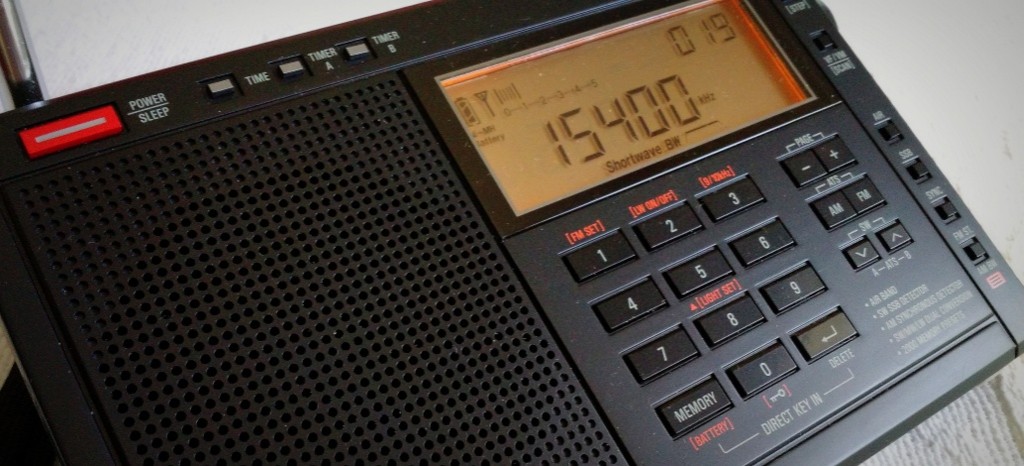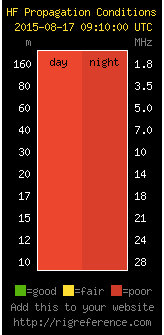Lately, I’ve had a number of emails from new readers that read something like this:
“I just purchased a new portable shortwave receiver, but I can’t seem to hear anything on it other than the strongest of stations. Should I return this radio? Am I doing something wrong?”
The SWLing Post attracts a lot of new shortwave listeners–which is terrific–but there’s nothing worse than being excited about a new hobby (and new radio) only to find that you can’t hear much of anything.
But right now, it may not be your fault–nor your radio’s.
There are many factors that influence what you can receive, so I typically send new listeners to this article, which is full of tips to help you get the most out of your radio.
But lately, even if you follow all of these handy tips, you may still find it difficult to receive distant stations–especially during daytime hours. The fact is, for the past few weeks, we’ve been experiencing fairly dismal shortwave radio propagation conditions.
How can we tell? Well, the K index–a scale from 0 to 9 which indicates the magnitude of geomagnetic storms–“K0” equating a quiet magnetic field, while “K9” indicates extreme storms–has risen to K6 and even K7 for the past two days, unusually high, indeed. The result? In radio terms, such unsettled conditions mean that shortwave signals simply can’t effectively propagate across the globe. To add insult to injury, sun spot numbers–which can indicate effective radio propagation–have also been somewhat low.
I understand how Post readers are feeling. I’ve been particularly sensitive to the crippling effects of the geomagnetism during this weak cycle, as I’ve been attempting to hear the elusive Radio Nacional Arcángel San Gabriel in Antartica…alas, not really possible right now.
Should we just give up, then, letting the sun and geomagnetism rule the day–? Not at all! Typically, these periods come and go within a matter of weeks. No worries, readers; you’ll soon find that your radios work just fine. In fact, at the conclusion of poor solar conditions, there are often excellent band openings…
The take-away here? Just stay tuned! Better listening conditions await.



Amen to all of the above. Have been in the radio hobby since the late ’50s, and this is by far the worst “trough” ever! I sold my linear amp ten years ago, thinking 100W enough power for 99% of conditions. WRONG! Short/medium range propagation on 80 or 40 definitely benefits from higher power. As for the upper bands, most days of late it’s just wall to wall noise. Now and then the curtain lifts on 20M, from here to Europe, but much less often to the Far East. I am very careful about design and employment of my antennas (all wire types) and have in the past had great results, but very poor lately- I sometimes check to make sure the wind hasn’t blown them down! All I can say is, for now, put up the best antenna possible and listen several times a week (or even within the same day) because openings may happen anytime. Hang in there! NZ5L
I live down under the rest of the world.Way under in a country called New Zealand,made up of two big long islands.Northisland and Southisland.The Tasman sea and Pacific oceans both meet together at the top of the Northisland of my country.Ive been a very keen SW,HF DXing listener for many years.Made Diode/crystal set radios for my class mates at school.But at my age of 66 now,Im very frustrated that with my expensive radio receiveing equipment,it all basicly sits collecting dust these days because “Hash”noise at night and dureing the day is so high.I live in the outer suburbs of our biggest city,Auckland.The area is all flat,almost at sea level.I have a 100 ft diopole antenna,that was built as a Ham antenna for my ham work,but interest in that has gone down the drain,because ham bands are so quite aswell.Probagation has been so bad,my gear just sits with no use.I do get rain noise/static and electrical interference,but the hash covers all frequencies right up to arround 17 mgs.Its spoiled a great hobby that I once had.I found coms very handy keeping up with the rest of the world.However I can not do that anymore.Even utility coms,from english speaking nations I cant receive.I will say though that alot of Asian stations seem to be where english speaking stations once were, and they are all over the bands but even they are quite weak.Even almost on offical english speaking coms frequencies,I hear the asian two way radios.I often wonder if they know the frequency spectrim,and if they should acturly be transmitting on those frequencies.Can be very anoying,because they are all there,yet no english coms. The Flavour of the hobby has gone.
That’s quite sad and discouraging at the same time. I am sorry for your loss. Perhaps propagation will pick up in the near future? Although I have been reading discouraging news regarding sun cycles perhaps disappearing altogether as the sun now enters into a middle age phase with no activity to come at all?
I’ve been a ham for like 60 years and this is by far the most dismal sun spot (or lack of there of) conditions ever that I can remember…..it’s been like a year since I’ve heard Japan on 40 meters at night….and Europe (I live on the West coast)….forget it…and it was a piece of cake at night over the N Pole as long as I can remember at any time during any past sun cycle….oh well…time for VHF UHF stuff…..
Sorry for taking so much time to admit it, but this was probably my fault. I got a new receiver in August and continuing a chain of odd coincidences over a few decades, I bought it when the conditions were bad. At least that’s what I thought the first 10 times this happened. The coincidence being so regular that I suspect it might be just the other way around – CONDX get bad b e c a u s e I acquire a new radio, or turn one on after a long hiatus. Or maybe some yet to be discovered cells in my brain sense solar activity or geomagnetic storms and give me an urge to purchase radios.
However, I’ve heard of similar musings from hams and SWLs and so this might just be some example of Murphy’s law, albeit a strange one that states that if you buy a radio and it isn’t broken / DOA, and it also didn’t get an “alignment” job from someone who can’t spell his own name, then the sun automatically prepares a radio blackout with a severity directly proportional to the price of the radio, while you’re on your way back home, or when you pull the trigger on Amazon In my case, the reliability of that mechanism is quite outstanding tho. Our civilization is very lucky that I never could afford a real high-end receiver which would have (almost certainly) led to a second Carrington event or at least a series of G5 storms.
Following that logic, the cheapest way of avoiding a truly catastrophic event like this for all authorities would be just giving me a really, really awesome receiver for free (so I won’t get a chance to buy one). Tadaa – colossal savings on satellites and grid reinforcements. 😉
I’m happy to know that someone else out there thinks the same thoughts I do! 🙂 So true.
good news -conditions back to normal. got all my stations and wwv tonite outside on the whip only.
i hope its better this eve. my new realistic dx60 arrived from ebay and i am dying to test it out . i was told a solar flare has wiped the band out recently
conditions so bad that the last 2 nights all i can get is china international radio and even then barley. outside on the whip or inside on the sloper its no good. i am in north florida
They are terrible at the moment. You’re right. Even blowtorch stations are weak and subject to deep fading. Can’t wait for those solar numbers to get better.
what part of the country are you in? it was fine here till 2 days ago. jax florida
I’m in North Carolina. Daytime propagation has been very bad for the past few weeks. Night time has been hit-and-miss.
Propagation has also been relatively poor in Kentucky over the last few weeks. On Thursday evening, however, I was able to receive many South American stations between 1 and 25 kW while sitting on the patio and using the whips on my PL660 and KA1103. On the other hand, the signals from Europe and Asia were below par.
Excellent write up (< comment to the editor) about solar disturbances and how they affect propagation. I have lived through the ups and downs in propagation particularly the Medium Wave or AM dial for the past 48 years as a radio DXer .
SW station listening sucks right now, BUT I went out at sunset and I was able to pick up hams working 40m band, The beautiful thing? They were in excess of 1000miles away! Awesome. So, some intercontinental listening going on for me.